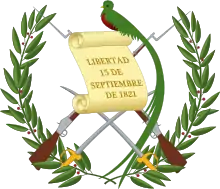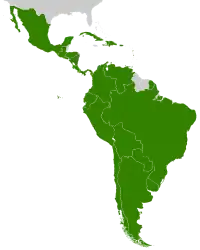Mass media in Guatemala is dominated in the area of commercial television by Mexican media mogul Remigio Ángel González, who since the mid-1990s has "virtual monopoly control of that nation's commercial television airwaves".[1] González controls four television stations in Guatemala - El Super Canal, Televisiete, Teleonce and Trecevisión.[2]
González, who also owns a majority of the country's cinemas,[1] had by 2000 also acquired 21 radio stations,[1] including Radio Sonora, known as a leader in news.[3] The other two major radio chains are Emisoras Unidas (owned by the Archila family) and Radio Grupo Alius (owned by Alfonso Liu), a chain of Christian stations which does not compete in news or music.[3]
A 2001 study of González' media properties in Guatemala and Nicaragua found that they had a tendency to squeeze out voices opposed to the government, and concluded that "Gonzalez’s ownership practices create an atmosphere that undercuts the development of democracy."[1] He has a strong influence in Guatemalan politics, for example giving $650,000 to Vinicio Cerezo's 1985 presidential campaign,[1] as well as more than $2.6 million and free airtime to Alfonso Portillo's 1999 campaign. "Political analysts say the free commercials helped Portillo win the election."[4]
After becoming president, Portillo "named Gonzalez's brother-in-law, Luis Rabbé, as his minister of communications, infrastructure and housing, a powerful Cabinet position whose jurisdiction includes the oversight of broadcast media."[4]
See also
References
- 1 2 3 4 5 Rockwell, Rick and Janus, Noreene (2001), "Stifling Dissent: the fallout from a Mexican media invasion of Central America, Journalism Studies, 2: 4, 497 — 512
- ↑ Dom Serafini, Video Age International, Central American Television Touched By An Angel, January 2010
- 1 2 Elizabeth Fox, Fox de Cardona Fox (2002), Latin politics, global media, University of Texas Press. pp52-3
- 1 2 Will Weissert, Associated Press, 9 June 2002, Domination of Latin airwaves has 'Ghost' scaring his critics

